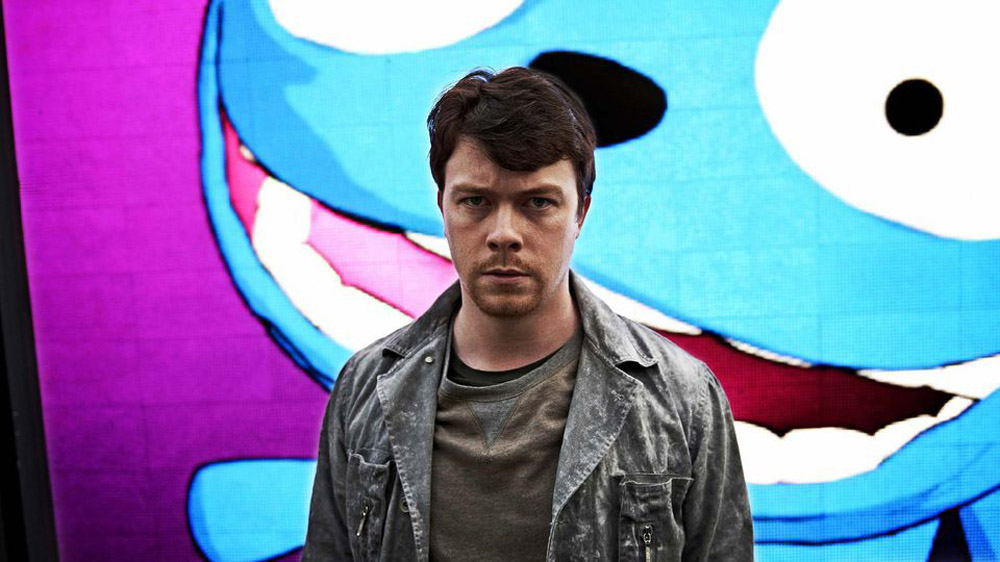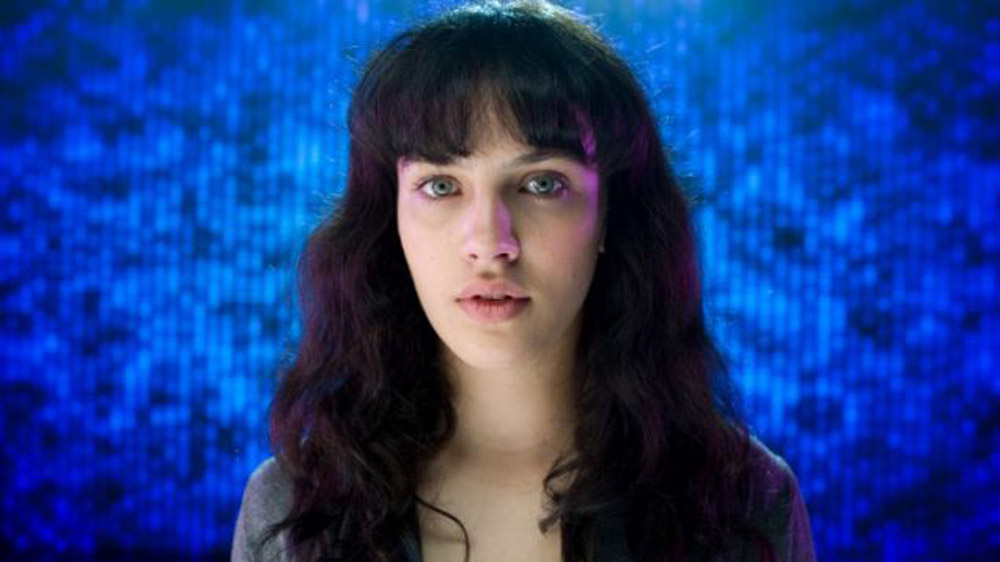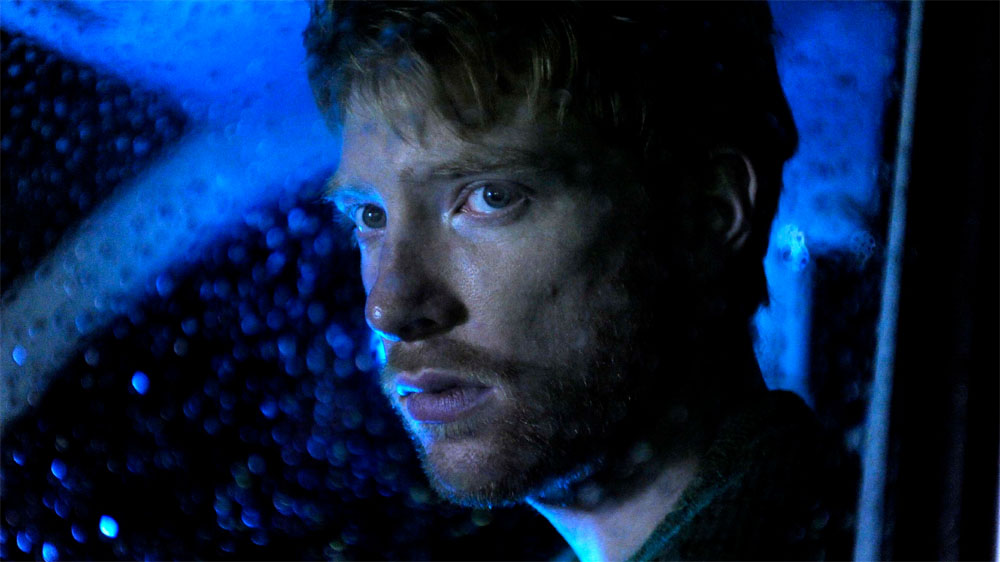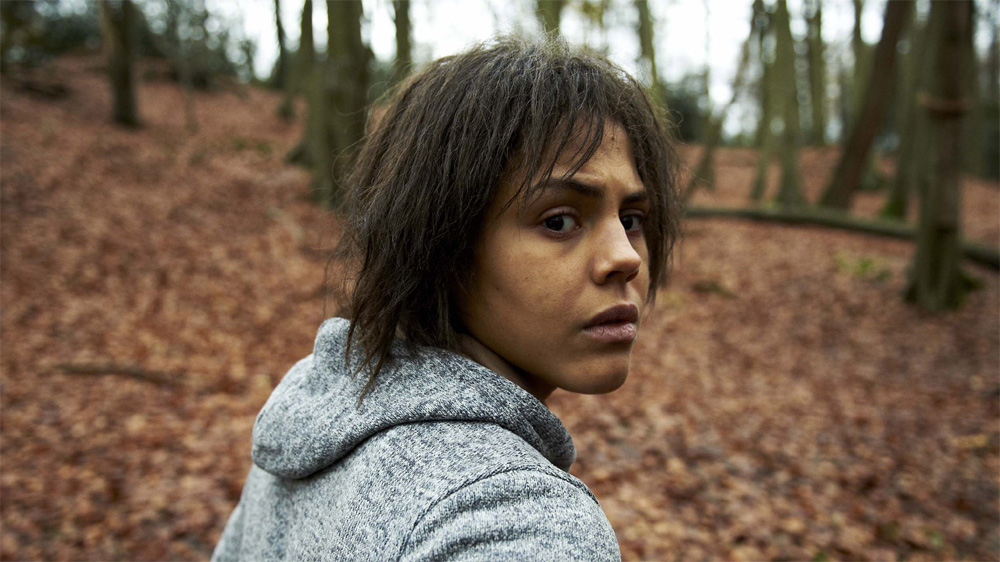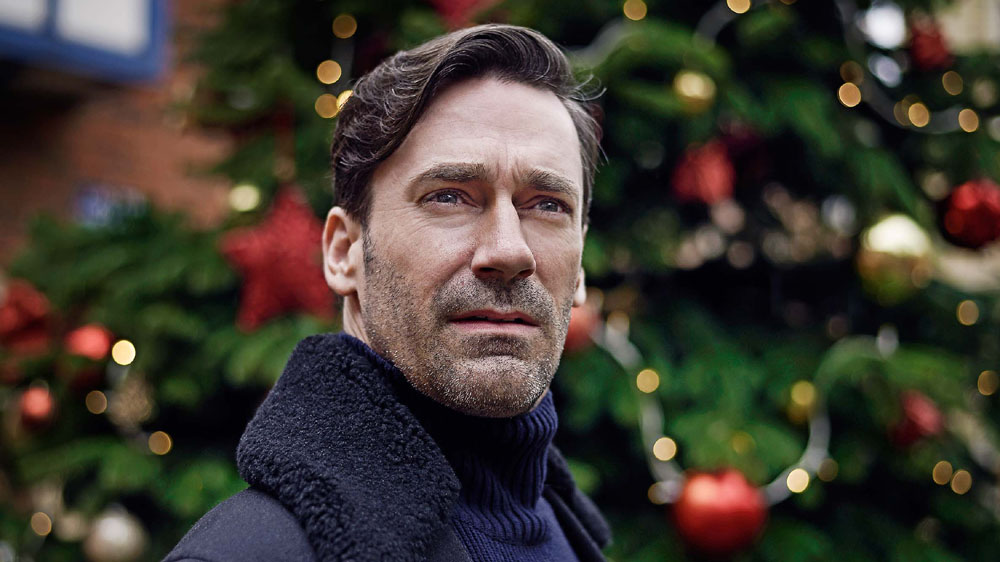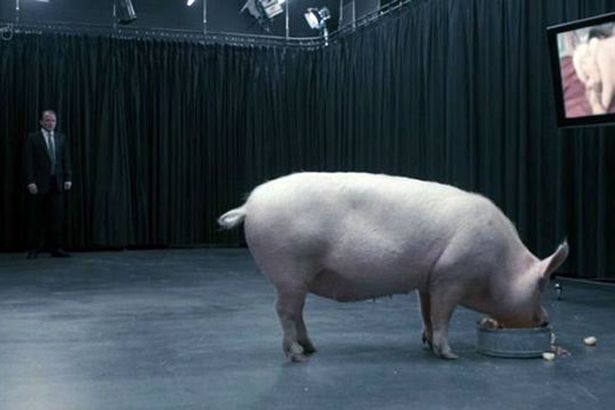Ranked from worst to best
Written for Cultbox – read the original review here
Five years ago Charlie Brooker unleashed the dystopian future-tech world of Black Mirror onto our the screens.
With no new episodes since Christmas 2014, the anthology series has jumped ship from Channel 4 to the international streaming shores (and bigger budgets) of Netflix. As we prepare to have our minds blown by six brand new episodes this Friday, we thought it would be a good opportunity to rank the original seven episodes.
As a side note, it’s worth mentioning that for this writer there are no ‘bad’ episodes of Black Mirror – many of the episodes could have shared joint positions and this should be seen as an order of preference rather than a list from worst to best. And believe me, even that was hard enough…
7. The Waldo Moment
“What are you? An old attitude with new hair assuming you’re my superior”
When this episode aired in 2013, British politics and politicians were already a divisive bunch – the Liberal Democrats had broken their promise not to raise university tuition fees in order to form the coalition government, claymation northerner Wallace was leading the Labour Party minus his trusty companion Gromit and, perhaps worst of all, George Osborne raised the tax on our beloved pasties.
So it was no surprise that Brooker chose to use a second season as an opportunity to explore political spin for a second time.
Our self-deprecating hero Jamie (Daniel Rigby) voices and controls Waldo, a giant blue cartoon bear on a late night topical satire show interviewing and humiliating politicians in a fashion not too dissimilar to Leigh Francis’s Bear on Bo Selecta. Jamie’s producer Jack Napier, played with Joker-esque vitality by Jason Flemyng, pushes Jamie/Waldo to run as MP against Tobias Menzies’s pompous Tory Liam Monroe.
Students and the less elite general public lap up Waldo’s sweary, erection obsessed, unrehearsed jokey remarks. When Monroe attempts to point out that Jamie is a failed comedian being fed what to say by his employers, Waldo bites back: “All the other MPs have got teams around them but we’re just more honest about it”.
Ultimately, Brooker shows that political parties cannot outdo the vast piles of cash that broadcasters have at their disposal, or rather how the Murdochs of this world influence our political system. ‘The Waldo Moment’ may not be as cutting or incisive as other episodes but should be applauded for the prescient look at 2016’s politics of ‘characters’ and buffoons.
Easter egg: Brooker initially came up with the idea of an animated MP with Chris Morris when they worked together on Nathan Barley.
6. 15 Million Merits
“It’s all just stuff, it’s confetti. What you’ve got – it’s real.”
It is only with hindsight that the second episode of the first season was the first that fully embraced Brooker’s techno-dystopia and arguably helped to label the programme as being one focused on new technologies. As any hardcore Black Mirror fan will tell you, the series is far more nuanced than that and ’15 Million Merits’ is a good example.
Daniel Kaluuya plays Bing, one of many cyclists on exercise bikes powering his surroundings and presumably the wider world in order to obtain Merits. They’re the currency of his world, used to buy food (look out for the vending machine’s Amazon-like suggestion of “people who liked apples also liked pears”), purchase upgrades for their virtual avatars and to skip annoying adverts that the inhabitants are forced to watch in their screen-lined home cubicles.
Bing overhears Abi (Jessica Brown Findlay) singing and encourages to enter ‘Hot Shots’, the nightmare evolution of shows like The X Factor with a panel of judges that include a bloke with an array of porn channels. He uses the twelve million merits he inherited from his dead brother and racks up the remaining three million in order to buy Abi’s entry on the show. Abi’s told she’s an above average singer and, having taken the mandatory cup of drug Compliance before going on stage, she ends up in the porn industry.
Whilst writing a weekly TV column for The Guardian, Brooker was renowned for his scathing remarks about reality television and with Dead Set he has previous form in exploring the genre. The inclusion of a reality star entering pornography, as a number of Big Brother contestants have done, highlights the real world desperation for fame, spurred on by a country wanting to watch rising stars for twelve weeks but not interested in the rest of their careers.
Bing becomes a pseudo-Brooker in this sense, forcing his way on to the Hot Shots stage with a shard of glass to his throat to deliver a blistering diatribe on the unimportance of fame. But depressingly even Bing isn’t insusceptible to the lure of a spotlight and ends up taking the chance to leave his cubicle and host his own twice-weekly half hour stream.
Easter egg: Abi appears on a city billboard in ‘The Waldo Moment’ and Hot Shots is being watched by Potter when he’s channel hopping in ‘White Christmas’.
5. Be Right Back
“I’m in the Cloud, you don’t have to worry about breaking me.”
The start of Season 2 brought with it a hauntingly beautiful portrayal of grief. Hayley Atwell’s Martha has just moved into a remote cottage with long term boyfriend Ash, a social media addict, when their short period of bliss is shattered as he’s killed returning the hired moving van.
The Feels are notched up a gear with Martha soon discovering she’s pregnant. Martha’s friend signs her up to a beta service that simulates a virtual Ash replica based on his online persona. Struggling with grief, Martha uploads photos and videos of Ash to the service and she is soon chatting to ‘him’ almost constantly. She upgrades the service further by purchasing a synthetic body that takes on Ash’s physical form, something that Martha at first embraces but soon becomes frustrated with.
‘Be Right Back’ is certainly the most emotionally charged of the seven episodes and it is easy to imagine that if (when?) a service like this became available in the real world that business would be booming very quickly. However, much like some people grow frustrated with a new partner not living up to the rose-tinted view of an ex, Martha longs for the real Ash and a synthetic substitute is never enough.
Although Domhnall Gleeson is great as Ash, this is really Hayley Atwell’s episode and it is no surprise she very quickly went on to bag herself some prime Hollywood roles. Special mention should also go to the sublime direction of Owen Harris for creating a beautiful episode to watch.
Easter egg: Martha’s pregnancy test, whilst not identical, uses the same animation as the one in ‘White Christmas’.
4. White Bear
“How do you like it now?”
Baying mobs are a popular theme on Black Mirror and they’re cranked up to 11 in ‘White Bear’. The incredible Lenora Crichlow (Being Human) wakes sat in a chair in a normal terraced house and no memory of who, where or when she is but with pills at her feet and bandages on her wrists.
Out of the window is an ordinary looking estate and on the mantelpiece sits a picture of her with a man and a school photo of a child she assumes to be her daughter. She has occasional glitched flashbacks and leaves the house, discovering people in the surrounding homes filming her on their mobile phones. A masked figure shoots at her but the bystanders just watch, glued to their devices. She meets Jem at a petrol station who aids her escape and tells her that a signal turned about 90% of people into spectators.
They meet Baxter, who tricks them into thinking he’s helping but threatens torture on them. They escape and reach the White Bear transmitter compound in order to destroy it when suddenly the walls come up and an audience sits applauding as the star of the show is strapped into a chair.
It’s this point in which the rug is pulled from under us. I remember when I watched the episode in 2013 thinking that it had been an extreme immersive theatre experience but the truth is far worse – she is Victoria Skillane who filmed her now dead fiancé as he tortured and murdered a kidnapped child called Jemima, her cuddly white bear becoming the enduring symbol in the hunt for her.
Having been branded by the judge as being a “uniquely wicked and poisonous individual” it was deemed “punishment would be proportionate and considered” – with the White Bear Justice Park being the end result, an experience Victoria is forced to relive every day. It’s hard not to be affected by the scenes of people booing and jeering a character that just five minutes earlier we were supporting and willing on to survive and this is Brooker’s masterstroke – whilst some would argue for extreme vengeance such as the introduction of castration or the return of capital punishment, Brooker highlights the human cost of such measures and forces the viewer to rethink their beliefs.
Easter egg: UKN, the in-world 24-hour news channel, makes a return when news clips from her case are played to Victoria as the truth is revealed to her.
3. White Christmas
“It’s a job not a jail.”
In some ways, ‘White Christmas’ is like the conclusion of an essay – it takes in many ideas from earlier episodes and serves as an epilogue for the Channel 4 Years. The episode is littered with Easter eggs from the previous six episodes whilst also managing to be an anthology episode within an anthology series.
We open to Wizzard’s classic ‘I Wish It Could Be Christmas Everyday’ playing in what looks like a cabin outpost, snow falling outside. Mad Men star Jon Hamm’s Trent complains that in five years he’s not heard more than three sentences from Rafe Spall’s Potter and in an effort to encourage him to talk, he offers tales from his previous jobs.
The first story is of socially awkward Harry (Rasmus Hardiker) gatecrashing an office Christmas party in order to hit on a girl whilst Trent provides “in the field assistance” through an eye-link (think in-built Google glasses) and advising him on what to say and wear. With their target acquired, Jennifer (Natalia Tena) spots him talking to himself and thinking she’s found a kindred spirit, takes him home. Harry had actually been talking to a group of guys watching Harry’s stream and although they think their luck is in it quickly transpires Jennifer is off her meds and given Harry a poisoned drink so that they can commit suicide together.
As Harry lays coughing up blood, Trent advises the group to “wipe everything”. Trent’s wife discovers what he was doing and blocks him – a bit like a Facebook block but with the human form turning into a grey blob and muffled noise.
In the second part, Greta (Oona Chaplin) leads a busy life and has undergone a minor medical procedure whereby an implant lies near her brain for a week before the ‘cookie’ is extracted and placed into what resembles an egg-shaped egg timer. Greta believes she’s woken up in an all-white room and struggles to comprehend that she is merely a copy.
Trent gently tortures her into complying, forcing the Greta copy to live three weeks in the space of the real world’s thirty seconds. She’s a mess but still non-compliant so puts her through ‘six months’ of nothing by which time she is begging for something to do. The Greta copy becomes a drone, completing meaningless tasks, something that Potter sees as barbaric slavery whereas others, Trent points out, would see it as code – “you have empathy, you’re a good man”, Trent tells him.
With his resolve weakened, the final part is handed over to Potter. It starts at his father-in-law’s cottage at Christmas, somewhere he and his wife Beth (Jane Montgomery) go every year. We see short snaps of their relationship – from Potter getting wasted watching karaoke (during which Beth sings Abi’s song from ‘Fifteen Million Merits’) to sharing dinner with Beth’s work colleagues (“I think she’s into him more than he’s into her”). He discovers Beth is pregnant but she’s adamant she doesn’t want it and ‘blocks’ him.
But the block remains and she disappears from his life. Every year he goes to the cottage to see her grey muted form and discovers she has kept the baby but blocks cover offspring too – “seeing something was better than nothing”. It’s only when Beth is killed in a train crash that the block is lifted and he discovers the child is not his but her work colleague’s. He cracks a snowglobe on the head of his father in law and abandons the child, who eventually freezes to death outside the house.
And then another Brooker Rug is pulled – the outpost Trent and Potter have been in is the father-in-law’s cottage, a constructed reality to convince Potter’s cookie copy to confess to murder. The real Potter is locked away in a prison cell refusing to talk but the police have all they need to convict him. Like ‘White Bear’ before it, the notion of punishment ad infinitum is suggested when the cookie is made to live out a thousand years of listening to Wizzard. Trent doesn’t walk away scot-free though – by providing an illegal service for peeping toms, and failing to report a murder, he’s blocked by society and must walk the streets seeing everyone as a muted grey but to them he’s bright red, sticking out like a sore thumb and branded for the world to see.
We could write an entire piece on ‘White Christmas’ alone as it’s packed with Easter eggs and tons of ideas to deconstruct, from the rights of an AI clone to the real world prospects of streaming video from your eyeballs. It’s a heavy watch but very much worth it and although it sometimes plays like a Greatest Hits episode, it’s not quite the best one…
Easter egg: ‘White Christmas’ is one giant Easter egg (or should that be Christmas cracker?) of an episode and we’d recommend reading this summary of all the links to each of the preceding episodes here.
2. The National Anthem
“Well I’m not fucking a pig! Page one, that’s not happening.”
This episode was a pig’s hair away from reaching the top spot. The first ever episode launched onto our screens on 4 December 2011 and pulled no punches from the get-go – before the first ad break we learned that nation’s sweetheart Princess Susannah, a faux Kate Middleton, had been kidnapped and the kidnappers wanted Prime Minister Michael Callow (the impeccable Rory Kinnear) to shag a pig on live TV later that day or she’d be killed.
There’s a Bullingdon Club believability to the episode, long before allegations of David Cameron having had similar porcine relations during his university days. The pomposity with which Callow dismisses the ransom serves to highlight the arrogance politicians hold themselves in, a demeanour that only relinquishes in the face of opinion polls, social media trolls and rolling media coverage.
Gradually worn down into committing an act of bestiality by public demand and lack of assurances of personal security should he refuse, the audience end the episode almost feeling sorry for Callow – particularly after the revelation that the princess was released before he committed the act but everyone was too busy watching the live broadcast to notice.
Whilst the pig sex may draw attention to the episode, it is Brooker’s mirror being held up to society that proves the most shocking – you can bet a similar real world scenario would also draw huge ratings and a political scramble of the same nature.
Easter egg: Slim pickings on that one, but it’s worth mentioning we get the first appearance of UKN, the Black Mirror world’s rolling news channel that later appears in other episodes.
1. The Entire History of You
“Because memory is for living.”
In some ways it’s a little odd that arguably the best episode of Black Mirror is the only one not written by Charlie Brooker (although Konnie Huq did co-write ’15 Million Merits’ with him). Jesse Armstrong, co-creator of Peep Show, takes that show’s point of view storytelling technique and transports it into a usable real world scenario.
The utterly brilliant Toby Kebbell plays Liam who we meet mid-appraisal at work. He can’t tell if it went well but thanks to a grain implant he’s able to perform a Redo – reliving memories to enjoy again or, in this case, agonise over every minor detail. Liam goes straight to a dinner party with his wife Ffion’s friends where they Redo the appraisal. Back at home, Redo is used to settle arguments and score points.
Liam’s jealousy gets the better of him and he’s convinced Ffion (the underrated Jodie Whittaker) had a fling with her friend Jonas. It all unravels slowly, meticulously, and rather painfully.
The beauty of this episode is just how seamlessly the viewer can picture the technology being integrated into the real world – the couple having sex but both watching a Redo of their favourite time with one another instead of enjoying the reality, the mother watching the Redo of her child to confirm how often the babysitter checked on the child, or reliving memories of happier times in the family home when in fact everything has fallen apart.
It’s a faultless episode and one that reverberates throughout the rest of the Black Mirrorworld.
Easter egg: The remote used to watch a Redo is seen again being used by characters in ‘White Christmas’ to block one another and, at one point, act as binoculars.

